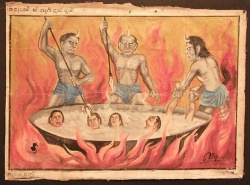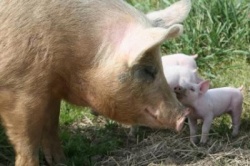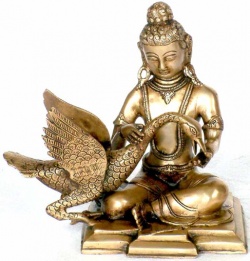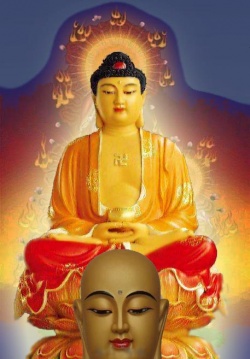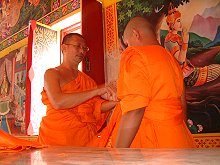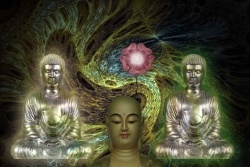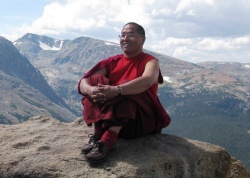Meat Eating by Indrajala
Meat Eating
By Indrajala (Jeffrey Kotyk)
Part I
I recently heard about Australia banning exports of live cattle to Indonesia over concerns that Indonesian meat producers were being unusually cruel to the animals in the slaughterhouse. Al-Jazeera has a brief report here:
After watching this it occurred to me that if some brave soul out there had not taped these abuses and submitted it to the media, the common consumer would be completely unaware this is happening. The People for the Ethical Treatment of Animals (PETA) is often seen in a negative light by common consumers for their aggressive tactics in promoting veganism. Whether you appreciate their methods or not, they still bring to light a lot of undocumented cases of animal cruelty and present it uncensored to the world. I personally appreciate what they do. They are primarily concerned with animal welfare and make many efforts to confront cruelty.
The reality of meat consumption in our modern day is that meat is produced in an industrialized fashion. Industrialized meat production in a capitalist system seeks to maximize profits and minimizes expenses, so the welfare of animals is not a concern in such a model. If it was not for the efforts of animal welfare advocates the situation would be even worse than it presently is. This is why I commend the efforts of those who film these atrocities and bring them to light.
One might wonder where vegetarianism fits in with Buddhism? There is no answer that all Buddhist traditions would find suitable.
The Śrāvakayāna school of Theravada, which takes the Pāli Nikāya as its canon, asserts that the Buddha ate meat and did not forbid the consumption of it. Venerable Dhammika addresses this question in his work Good Question Good Answer:
- QUESTION: Buddhists should be vegetarians, shouldn't they?
- ANSWER:
- Not necessarily. The Buddha was not a vegetarian, he did not teach his disciples to be vegetarian and even today there many good Buddhists who are not vegetarians. In the Buddhist scriptures it says;
- ‘Being rough, pitiless, back-biting, harming one’s friends, being heartless, arrogant and greedy –this makes one impure, not the eating of meat.
- Being of immoral conduct, refusing to repay debts,
- cheating in business, causing divisions amongst people - this makes one impure, not the eating of meat.’ Sn.246-7
However, in the Mahāyāna canon we find scriptures where the Buddha forbids the consumption of meat. One such scripture is the Laṅkāvatāra Sūtra where the whole sixteenth chapter is dedicated to explaining why the Bodhisattva aspirant should not eat meat. Consider the following quote:
- 《入楞伽經》卷8〈16 遮食肉品〉:「佛告大慧:「夫食肉者有無量過,諸菩薩摩訶薩修大慈悲不得食肉,食與不食功德罪過我說少分,汝今諦聽。大慧!我觀眾生從無始來食肉習故,貪著肉味更相殺害,遠離賢聖受生死苦;捨肉味者聞正法味,於菩薩地如實修行速得阿耨多羅三藐三菩提,復令眾生入於聲聞辟支佛地止息之處,息已令入如來之地。大慧!如是等利慈心為本,食肉之人斷大慈種,云何當得如是大利?是故,大慧!我觀眾生輪迴六道,同在生死共相生育,迭為父母兄弟姊妹,若男若女中表內外六親眷屬,或生餘道善道惡道常為眷屬,以是因緣我觀眾生更相噉肉無非親者,由貪肉味迭互相噉,常生害心增長苦業流轉生死不得出離。」」(CBETA, T16, no. 671, p. 561, b8-23)
- The Buddha told Mahāmati, "Meat eating has countless offences. Bodhisattva-mahāsattvas practise great compassion and cannot eat meat. I will speak of eating [meat], not eating [meat], the merits and the offences. You now must listen well.
- Mahāmati! I see that because of the habits of sentient beings from the beginningless past to eat meat that they crave the flavour of meat and mutually kill and harm one another. They are far departed from the wise and holy, and experience the suffering of saṃsāra. Those who reject the flavour of meat hear of the flavour of the true true dharma and properly practise through the grounds of the Bodhisattva to quickly attain unexcelled perfect enlightenment (anuttarā-samyak-saṃbodhi). One also makes sentient beings enter the grounds of the Śrāvaka and Pratyekabuddha - a place of rest, whereupon resting they enter the ground of the Tathāgata.
- Mahāmati! These benefits have at their foundation the mind of compassion. The person who eats meat severs the seed of grat compassion. How does one attain these great benefits? It is thus, Mahāmati, that I see sentient beings being born in the six paths through cyclic existence. Together within saṃsāra they give birth and nurture each other, alternating as father, mother, elder brother, younger brother, elder sister and younger sister. They may be male or they may be female and born as kinsmen, or they may be born in other paths including good paths and evil paths. They are frequently relatives. With these relations I see that the meat mutually consumed by sentient beings are all of one's relatives. It is due to craving meat that they alternate in consuming one another. They constantly give rise to a mind of harm, increasing the karma of their suffering and being unable to escape from the stream of life and death."
The entirely of this chapter in English is available here.
Similar thoughts are echoed in another scripture prominent in East Asia the Brahma Net Sūtra where it is explained that the Bodhisattva does not consume meat as a precept.
- 《梵網經》卷2:「若佛子。故食肉一切肉不得食。斷大慈悲性種子。一切眾生見而捨去。是故一切菩薩不得食一切眾生肉。食肉得無量罪。若故食者。犯輕垢罪。」(CBETA, T24, no. 1484, p. 1005, b10-13)
- "If one be a son of the Buddha (buddha-putra), one must not intentionally eat any meat as it severs the innate seed of great compassion. Sentient beings will see [a meat eater] and flee. It is for this reason that all Bodhisattvas must not eat the meat of any sentient being. There are immeasurable transgressions when one eats meat. If one intentionally eats [meat], one violates a minor defiling transgression."
The two aforementioned scriptures were especially prevalent and well-read in East Asia. This includes both Chan and Japanese Zen. Unfortunately, nowadays the latter pays lip service to vegetarianism. Monasteries are supposed to be vegetarian in principle, but in truth they are not. One source told me that at Eihei-ji, the head temple of Soto Zen in Japan, people will smuggle in McDonalds to their friends inside the monastery and bribe the doormen in the back with some of the food.
While modern day Japan, including Japanese Buddhism, has largely abandoned their vegetarian culture which was was widespread until at least the late 19th century, vegetarianism is still widely a common lifestyle in Taiwan where orthodox traditions of Buddhism thrive. Taiwanese Buddhists are quite adept at cooking without meat and anywhere on the island you can find a vegetarian restaurant. Korean Buddhist monastics likewise are vegetarian, though meat consumption in the country is rapidly rising due to economic development and the infiltration of western consumer culture. Buddhist monastic communities in China and elsewhere like in Singapore and Malaysia still maintain vegetarianism.
It is worth noting that Tsem Tulku Rinpoche in Malaysia, a monk from the Tibetan Gelug-pa tradition, actively advocates vegetarianism through his organization Kechara House. Take a look at his blog entry here for example.
In Tibetan history there is one famous yogi named Shabkar Tsodruk Rangdrol (1781-1851) who advocated abstaining from meat consumption. We have the good fortunate to have access to his writings in translation. See here. His verses are quite graphic:
- All of you who eat this baneful food,
- The flesh and blood of beings once your parents,
- Will take rebirth in Screaming and the other burning hells,
- There to bake and boil.
Tibetan Buddhism has recently shifted towards vegetarianism in a strong way in recent decades. One of the most notable figures to go vegetarian is the Karmapa XVII, H.H. Orgyen Trinle Dorje who decreed that no Kagyu-pa monastery will prepare meat in its kitchens and is quite firm on matters related to Kagyu-pa members consuming meat. For details see here. For a further list of major Tibetan teachers advocating vegetarianism look here.
I noticed in my travels throughout India and Nepal that Tibetan restaurants catered to both meat eaters and vegetarians. I think part of this has to do with catering to tourists, but I suspect a lot of modern Tibetans, perhaps in particular those in largely Hindu communities, are starting to lean towards vegetarianism for the reasons outlined by numerous teachers.
Setting aside scriptures, I think it goes without saying that abstaining from consuming meat is ethically sound both in terms of concerns for animal welfare and the environment. According to the Japanese Ministry of Agriculture, Forestry and Fisheries report, to produce 1 kilogram of beef requires 11 kilograms of grain. Pork requires 7 kilograms. Chicken requires 4 kilograms. One can imagine that such quantities of grain could be better spent preventing hunger in the world rather than providing cheap hamburgers at fast food restaurants, but moreover such vast production of grain to produce meat means more fossil fuels being burned to fuel the industrial machine which is wrecking our global environment. From an environmentalist perspective it is best to not contribute to the dirty business of meat production.
Some years ago I used to eat meat and after being presented with some of the arguments above and seeing a number of videos released by PETA, I decided it was unacceptable to eat meat. For the sake of animals I made a vow never to eat meat ever again. I gave it up and have never regretted that decision. After a short while I found the smell of meat revolting. In a country like Japan where vegetarianism is seldom understood, it can be difficult, but compassion overrides any desire for social conformity. Some of my Japanese friends have said they would like to give up meat, but given that the culture here does not really allow for individuals to give up all meat and fish, they are unable. One risks being a social pariah, unemployed and socially handicapped should one seek such "special treatment". I get away with it because I am a foreigner and nobody expects anything from me.
I will continue this discussion of meat eating in a future entry. I would like to explore some of the historical commentary literature of the past which examined this issue as well as the permissibility of eggs and dairy.
Part II
Historically dietary prohibitions have played a key function in most Buddhist traditions. Traditionally, monks and nuns have been expected to refrain from eating after their midday meal and even then there are rules against eating more than one serving or stashing away food for the next day. Vegetarianism, which I have touched on elsewhere on this blog (see Part I here), has also been a noteworthy development in East Asian Mahāyāna. However, long before such developments there were prohibitions on the consumption of meat and even certain kinds of fruit as well.
It might surprise some to know that there were prohibitions against eating certain kinds of fruit. The Buddha is recorded in the Mahāsāṃghika Vinaya laying down the prohibition as follows:
- 《摩訶僧祇律》卷20:「食墟邏果。迦比哆果。比邏婆果。拘陀羅果。此諸果食者令人醉。食者越毘尼罪。」(CBETA, T22, no. 1425, p. 387, b18-20)
- Eating the kola (墟邏果), kapitthaka (迦比哆果), bilva (比邏婆果), and the kutumburu (拘陀羅果) - these fruits when eaten make a person intoxicated. Eating them is a Vinaya transgression.
The phonetic transliteration of Indic words in the Chinese translation, rather than translating them, indicates that possibly the translators Faxian 法顯 and Buddhabhadra were uncertain that such fruits existed in China. The Mahāsāṃghika Vinaya is incidentally thought by scholars to represent the most ancient Vinaya rendition available to us given its brevity and fewer rules compared those of other schools. An interesting article concerning this is Janice Nattier and Charles Prebish, “Mahāsāṃghika Origins: The Beginnings of Buddhist Sectarianism,” History of Religions 16 (1977): 237-272 (available here).
The Vinaya literature also records that the Buddha did forbid the consumption of certain kinds of flesh. As it is relayed in the Mahāsāṃghika Vinaya the Buddha forbid the consumption of the following meats:
- 《摩訶僧祇律》卷32:「一人肉。二龍肉。三象肉。四馬肉。五狗肉。六烏肉。七鷲鳥肉。八猪肉。九獼猴肉。十師子肉。」(CBETA, T22, no. 1425, p. 487, a23-25)
- 1. Human flesh.
- 2. Serpent flesh.
- 3. Elephant flesh.
- 4. Horse flesh.
- 5. Dog flesh.
- 6. Crow flesh.
- 7. Vulture flesh.
- 8. Swine flesh.
- 9. Monkey flesh.
- 10. Lion flesh.
There were differing incidents which led to each being prohibited. Most prohibitions in the Vinaya were brought about due to an incident having occurred and a subsequent house rule being laid down against it. These eventually evolved into formal precepts and institutionalized vows which the ordained clergy were initiated into, though following all Vinaya rules has seldom proven realistic throughout history. Nevertheless, one thing to note is that they were originally just house rules for the community, which in their own context made sense at the time.
The prohibition against eating human flesh came about when a laywoman cut off her own flesh to give to a bhikṣu for its medicinal qualities, much to the later distress of her husband who fainted on seeing what she had done. Fortunately as the story goes, the bhikṣu used his concentrative power to make her wound quickly heal. When the Buddha found out about this he laid down the rule against eating human flesh. Whether this actually happened or not, this does at least tell us that in the Buddha's time in ancient India human flesh was thought to have medicinal qualities.
The prohibition against elephant meat is also intriguing as it reveals caste concerns. Again the Mahāsāṃghika Vinaya records the incident as follows:
- 《摩訶僧祇律》卷32:「佛住王舍城。時瓶沙王象死。有諸小姓旃陀羅食肉。諸比丘亦有食者。時耆舊童子至佛所。頭面禮足却住一面白佛言。世尊瓶沙王象死。有諸小姓旃陀羅噉肉。諸比丘亦有噉者。比丘者出家人。人所敬重。唯願世尊。莫令食象肉。世尊為童子隨順說法示教利喜。頭面禮足而退。時世尊往至眾多比丘所。敷尼師檀坐。為諸比丘具說上事。佛言。從今已後不聽食象肉。乃至象髓亦不聽食。聽以象牙骨作鉢支衣細[1]結無罪。」(CBETA, T22, no. 1425, p. 486, c27-p. 487, a7)
- The Buddha was residing in Rājagṛha. At that time the elephant of King Bimbisāra died. There were low caste caṇḍāla who ate the meat. There were also some bhikṣus who ate some. At that time some elders and youth went to the Buddha. They prostrated themselves at the feet of the Buddha and stood at one side addressing him, “World Honored One, the elephant of King Bimbisāra died. There have been low caste caṇḍālas who ate the meat. There were even bhikṣus who ate some. A bhikṣu is a renunciate. They are respected by people. We respectfully ask the World Honored One to not let them eat elephant meat. The World Honored One accordingly taught the Dharma, and taught on benefits and happiness. They prostrated themselves at his feet and departed. At that time the World Honored One went to the bhikṣus and laid out his sitting cloth before being seated. He explained the earlier incident to the bhikṣus. The Buddha said, “From now onward eating elephant meat is not permitted. Even eating elephant marrow is not permitted. It is permitted and there is no transgression if elephant tusks and bones are used to make bowl holders and clothes buttons.”
This is striking because it shows the Buddha as concerned about the general image of the community. Here it is not problematic that they ate part of the dead elephant, but simply that it was a base thing to do and clearly distressed some people. Clearly eating the flesh of a dead elephant with the low caste caṇḍāla was unseemly and drew criticism to the sangha. Here we might think this is attachment to forms, but the Buddha often displays in the Vinaya literature a practical approach to things. While the bhikṣu renunciates were not members of ordinary society, they still relied on ordinary people for their food, clothing and medicine, hence the general image of the community was important.
The prohibition against vulture meat is worth looking at here as well:
- 《摩訶僧祇律》卷32:「佛住舍衛城。時有比丘食鷲鳥肉。比丘近林中經行。有諸群鷲逐比丘鳴喚。諸比丘以是因緣往白世尊。乃至佛言。從今已後。不聽食鷲鳥肉。乃至鷲髓亦不聽食。若須翅翮外用者無罪。」(CBETA, T22, no. 1425, p. 487, a19-23)
- The Buddha was residing in the city of Śrāvastī. At that time a bhikṣu ate the meat of a vulture (gṛdhra). He went travelling, walking along close to the forest and a flock of vultures followed him squawking. The bhikṣus went to the World Honored One [the Buddha) to ask the cause of this. The Buddha then said, “From now on I do not permit vulture meat to be consumed. Not even the marrow of a vulture is permitted to be consumed. If needing the wing for external purposes [a quill], then there is no transgression.
Here again it is not that eating the meat was inherently wrong, but simply that there was a past disturbance due to eating it and as such he laid down a rule against it.
The Vinaya literature actually does not promote vegetarianism at all. Early Buddhism and Śrāvakayāna schools do not appear to have felt it was important. One bhikkhu from Thailand once explained to me, “Eating meat is not the problem. It is desire for the meat that is the problem.” This kind of reasoning is of course valid and seems to have been the general idea in early Buddhism when it came to meat consumption, though at some point in India in later centuries meat eating became unseemly with Brahmins and many people adopted vegetarianism. There is Mahāyāna literature which appears and speaks of the ills of eating meat, such as the Mahāparinirvāṇa Sūtra among others.
That the Vinaya does not demand vegetarianism while some sūtras do became an issue in China. This issue was raised for discussion during the reign of Liang Wudi 梁武帝 (r. 502–549), who drafted his formal prohibition forbidding the monastics from eating meat, which actually met with protest from the Buddhist monks given that they had already established themselves in living according to the Vinaya, which permits the consumption of meat under certain conditions. The response to this was as follows:
- 《廣弘明集》卷26:「律雖許噉三種淨肉。而意實欲永斷。何以知之。先明斷十種不淨肉。次令食三種淨肉。未令食九種淨肉。如此漸制。便是意欲永斷。」(CBETA, T52, no. 2103, p. 299, a23-26)
- Although the Vinaya permits eating the three kinds of pure meat, the intent was actually to forever stop it. How do we know this? First it is clear that the ten kinds of impure meats were stopped. Next the three kinds of pure meat were allowed to be consumed. In the end[2] the nine kinds of pure meats were permitted to be consumed. Like this there was gradual prohibition, the intent being to forever stop [meat eating].
The idea is that while the Vinaya literature does not speak of vegetarianism, the intent of the aforementioned prohibitions on certain kinds of meat were actually a gradual lead-up to the later full prohibitions as described in the Mahāyāna literature. The nine kinds of pure meat are additional stipulations which make meat eating all the more inconvenient (and perhaps undesirable), such as the animal having died on its own of natural causes.
This is problematic from the perspective of the modern scholar as the Mahāyāna literature is thought to have been penned down several centuries into the development of Buddhism in India. In other words, the historical Śākyamuni Buddha did not completely prohibit meat and encourage vegetarianism as seen in some Mahāyāna literature. Thus the Vinaya reflects his lack of vegetarianism. However, until such a perspective arouse in modern times generally all Mahāyānists accepted the Mahāyāna scriptures as being just as much buddhavacana (words of the Buddha) as the Āgamas and Nikāyas, hence they could not outright dismiss them.
Now the question arises: if scholars are saying that Śākyamuni Buddha did not in fact teach the Mahāyāna sūtras which prohibit meat consumption, are we not free to give up vegetarianism? I personally do not support such a position. I think the Mahāyāna sūtras have different aims in mind. I think they are the "words of a buddha" rather than being strictly speaking the words of the historical figure Śākyamuni Buddha, which in my mind makes them valid. If your aim is personal liberation, then perhaps the well-being of animals and butchers will not be so pressing, but if you are concerned about the welfare of all beings, human or otherwise, then there are many advantages to refraining from eating meat, and perhaps eggs and dairy as well in our present time.
Footnotes
Source
by Indrajala (Jeffrey Kotyk)
huayanzang.blogspot.com.au
huayanzang.blogspot.com.au

